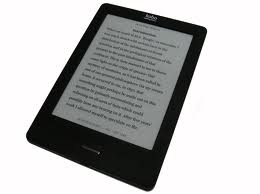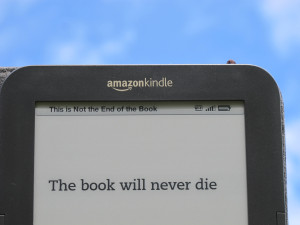Rise of the e-Books: Screen v.s Paper

As an avid reader, I was somewhat wary of the eReader at first. I proclaimed loudly that they would never replace actual books. To me, books were far superior, and I maintain there’s nothing like the feel of a good book in your hands, the smell of new pages, the smell of old pages, or the excellent feeling of thumbing the pages.
Books are great. There is nothing quite like a worn in book, that has a creased spine, ruffled pages, and folded corners. You can literally judge a book by its cover in that regard. To me, a book that seems perfect and pristine is a book that has been unloved. A worn and tattered book has been used as a book should be, it has a history of its own, and clearly means more to the owner than one that looks like it has never left the bookshelf.
That is where eReaders come in. I always thought things like Kindles or Kobos could never replace that connection with an actual physical book. Within their virtual pages they seemed cold, distant and unattached. You cannot tell how often a story has been read on an eReader. The pages do not tell any tale beyond the one found in the words on the page. That is a shame, if you ask me, and it leaves something missing from the reading experience.

But this is a technology magazine, so I wouldn’t be talking about it unless I had relented to technology’s relentless advances. Well, relent I did. Having read a short story (Sharpe’s Christmas, if you feel the need to know) on a friend’s eReader I found myself slightly swayed and curious. I ended up buying a Kindle, the basic one designed solely for reading, and I must admit I didn’t regret it. The screen is a decent size and the words are clear and easy to read. The lack of screen glare is essential to this, and though it means you cannot read without sufficient light, it allows the Kindle to retain a sense of actual pages, and doesn’t wear at your eyes the way a computer screen can. It is also much simpler to hold than a book, as you can rest it anywhere without the need to restrain the pages from shutting. The built-in dictionary is also a blessing, for those pesky books that like to use archaic or technical language that may have gone over your head. It’s also remarkably thin, though not quite as pocket friendly as suggested because it is still broad and tall (At least for the majority of my pockets).
Perhaps the greatest feature, though, is the ability to instantly download any book you may want to read. It puts an absolutely vast library at your fingertips, that you can browse at will if you are connected to the internet. You can browse and even sample the books before you buy them. You are, essentially, exploring and browsing a virtual bookshop from the comfort of your own home. There’s also a lot of significant value for money, I bought the Complete Sherlock Holmes Collection for a mere 72p. 72p, man. That is absolutely nothing at all, and almost made the purchase of Kindle worth it just for that. I also picked up the complete works of Oscar Wilde, Mark Twain and Charles Dickens, and as I recall the most expensive of them was about £1.90. As much as I would like some of those complete works in physical form, it’s hard to compete with such prices and ease of access. That is not to say, however, that all books on the Kindle are so cheap; New releases and chart toppers are often similar in price to their paper counterparts.

There are still drawbacks to the Kindle. When putting your books into “collections”, you have no real say on their ordering. I have the entire Sharpe series by Bernard Cornwell, which is twenty-three books all told, and they are placed in alphabetical order…which is all well and good, but I’d like to be able to place them in chronological order. I don’t know, I guess I’m a stickler for that sort of thing. I cannot and will not totally abandon proper books but nonetheless, I am a converted fan of the Kindle. It can hold thousands of books, and as somebody who loves being able to carry around my entire music library on my iPod, I also love being able to carry around the vast majority of my book library on my Kindle, bar the books I already owned in paper form beforehand.
I understand and, indeed, enjoy the benefits of the Kindle and other eReaders, and I sense that is the way reading is heading in the future. I do like technology, but I loathe to leave proper paperback books. I look at enough screens during my day as it is, and being able to pull away and lose myself between the actual pages of an actual book is a luxury I’m not ready to relinquish just yet. So I do suggest the Kindle to avid readers, but insist that it can never truly replace the bond formed between reader and physical book – And I hope fellow readers would agree with me on that.


